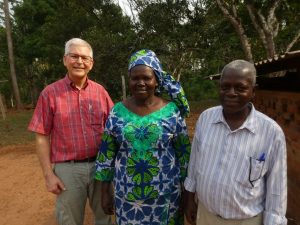In March, I visited Gbadolite and six of the seven regions of the Wasolo Pool. I went to listen – to be present to those far from the center of the CEUM. I knew the division within the CEUM would be one of the topics we would discuss, but I did not expect it to dominate our conversations as it did.
Heading to Wasolo
On March 10, my driver (Texas Ata) and I set out from Gemena, together with Rev. Dido Nzapaye, the superintendent (responsible pastor) of the Gbadolite region. 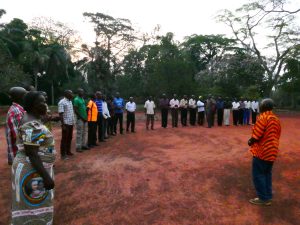 At Karawa, we stopped briefly to let off a passenger and to pick up our assistant driver (known as “Seconde”). Seconde’s primary job would be to walk the really bad holes and bridges before we attempted to drive them. At Gbado Gboketsa, we stopped for an early supper and picked up former (Honorary) president of the CEUM, “Papa” Luyada Gbuda (in the orange shirt). From there, we drove to Gbadolite where we were welcomed under the “bâche” (tarp), given supper, and sent to bed, I at the home of a local businessman.
At Karawa, we stopped briefly to let off a passenger and to pick up our assistant driver (known as “Seconde”). Seconde’s primary job would be to walk the really bad holes and bridges before we attempted to drive them. At Gbado Gboketsa, we stopped for an early supper and picked up former (Honorary) president of the CEUM, “Papa” Luyada Gbuda (in the orange shirt). From there, we drove to Gbadolite where we were welcomed under the “bâche” (tarp), given supper, and sent to bed, I at the home of a local businessman.
The next morning, we visited the vice-governor and the local immigration office, where we, as representatives of the CEUM, received a sermon about unity. Before those courtesy calls, however, I was dropped off at the “Macedoine” church to meet with the leaders of the breakaway group called “Trois Pools.” Trois Pools is so named because the CEUM is divided into five “pools” of regions. Two of those pools have two/thirds of the CEUM members, dominate the CEUM administration, and receive most of the material assistance that comes from the Covenant. In 2020, people from the other three pools banded together to establish a new denomination that some call Trois Pools (Three Pools).
At our meeting, Pastors Mawe, Adu, Gerebanga, and Balabala had hard things to say about the CEUM and certain CEUM leaders, but I listened and attempted to respond as well as I could. That ended up being a pattern that was repeated again and again during my trip. At the end of this particular conversation, I asked who I should visit when I arrived at Wasolo and the four offered to contact people to come see me.
From Gbadolite, we headed west, stopped briefly at Kotakoli and arrived at Yakoma at dusk. Following are some photos of that part of our trip.
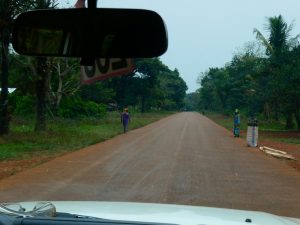
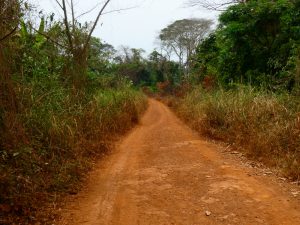
.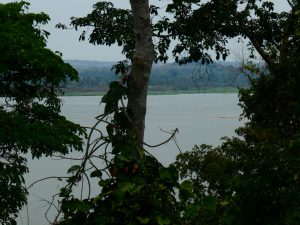
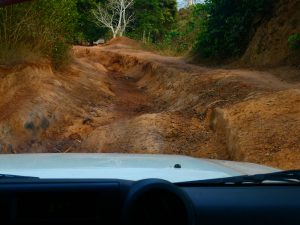
.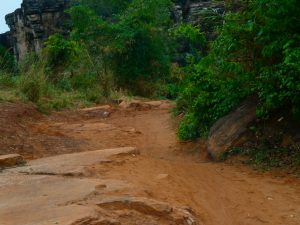
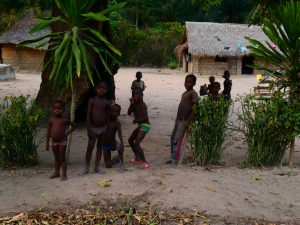
After a brief stop at Yakoma, we continued to Wasolo in the only rainstorm we saw during our travels.
Reaching Out from Wasolo: Saturday and Sunday
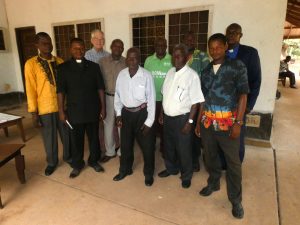 The next morning, I met with the spiritual and technical leaders of Wasolo before we headed back to Yakoma. When I asked about the challenges they faced, their immediate response was to point to the division in the church that led to tension in everyone’s lives. Other challenges paled in comparison.
The next morning, I met with the spiritual and technical leaders of Wasolo before we headed back to Yakoma. When I asked about the challenges they faced, their immediate response was to point to the division in the church that led to tension in everyone’s lives. Other challenges paled in comparison.
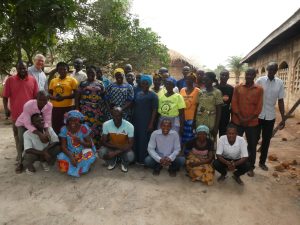 In Yakoma, I first met with the lay-leaders of the CEUM-loyal church led by Rev. Koto Kambo. They rejoiced in their membership in God’s Kingdom and were committed to their local community. However, they regretted being separated from their brothers and sisters and complained about being shunned by the breakaway church. They would greet each other on the street and attend weddings and funerals together, but they could never freely worship together.
In Yakoma, I first met with the lay-leaders of the CEUM-loyal church led by Rev. Koto Kambo. They rejoiced in their membership in God’s Kingdom and were committed to their local community. However, they regretted being separated from their brothers and sisters and complained about being shunned by the breakaway church. They would greet each other on the street and attend weddings and funerals together, but they could never freely worship together.
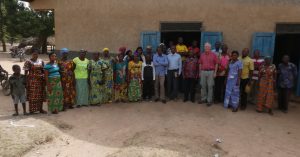 After that meeting, I was driven down the street to the church led by Rev. Zaga, one of the first church leaders to break away from the CEUM (in 2008). Rev. Zaga called his movement “CEUM Réforme” when we met, even though he had allied himself with the leaders of Trois Pools and had also led the “CEUM-Nord” in the past. He told me up front that reconciliation was not an option, so I respond
After that meeting, I was driven down the street to the church led by Rev. Zaga, one of the first church leaders to break away from the CEUM (in 2008). Rev. Zaga called his movement “CEUM Réforme” when we met, even though he had allied himself with the leaders of Trois Pools and had also led the “CEUM-Nord” in the past. He told me up front that reconciliation was not an option, so I respond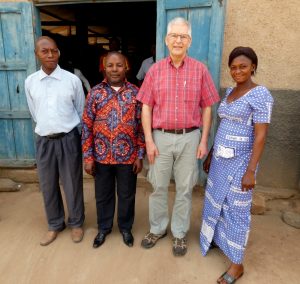 ed that I was there merely to listen and to join in conversation. He criticized Rev. Luyada for not coming with me to listen, but when I explained that Papa Luyada was trying to give me space to speak on my own, he responded that they had no issue with Luyada as a person, only with things that he has done. “After all,” he continued, “he is our teacher.” When we returned for photos four days later, I found Rev. Zaga speaking with Rev. Luyada, asking if he could send students to the Bible Institute that Luyada directs at Gbado Gboketsa.
ed that I was there merely to listen and to join in conversation. He criticized Rev. Luyada for not coming with me to listen, but when I explained that Papa Luyada was trying to give me space to speak on my own, he responded that they had no issue with Luyada as a person, only with things that he has done. “After all,” he continued, “he is our teacher.” When we returned for photos four days later, I found Rev. Zaga speaking with Rev. Luyada, asking if he could send students to the Bible Institute that Luyada directs at Gbado Gboketsa.
In looking back at this and other incidents, I conclude that the issues that cause churches to break away are real, but so are the deep relationships that hold people together. Even the names of the breakaway groups show a longing to somehow remain connected to the CEUM.
As we returned from Yakoma, Pastor Ali (our host at Wasolo and the supervisor of the seven regions of the Wasolo Pool) told me that I would be preaching at the 5:30 worship service the next day. After supper, I had some quick work to do before bed, but I trust that God was able to use my words for his glory. As is true everywhere I go in Congo, worship was uplifting and full of joy. My only disappointment is not being able to share the joy expressed – even in a dark sanctuary early in the morning.
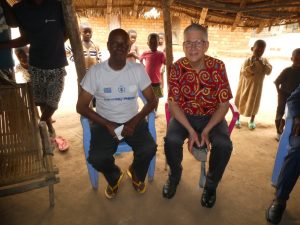 After the worship service, we got back in the truck and headed for Abumombazi (Abuzi). Our first stop, however, was to visit the “Chef de Groupement” in Taragini.
After the worship service, we got back in the truck and headed for Abumombazi (Abuzi). Our first stop, however, was to visit the “Chef de Groupement” in Taragini. 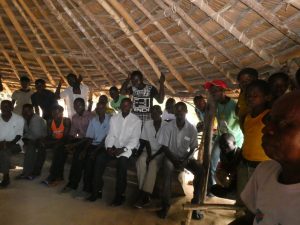 He has been a steady supporter of the work at Wasolo, so it was important to meet with him. As you can see, people crowded into his peyote to hear our brief conversation.
He has been a steady supporter of the work at Wasolo, so it was important to meet with him. As you can see, people crowded into his peyote to hear our brief conversation.
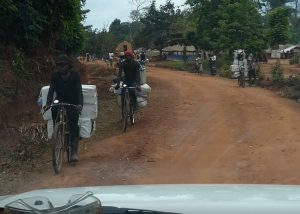
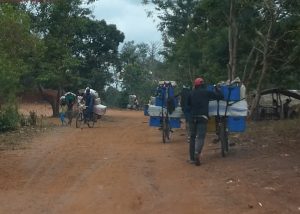 As we headed to Abuzi, we saw dozens of bicycle merchants carrying supplies the 170 miles from Bumba to Yakoma and beyond.
As we headed to Abuzi, we saw dozens of bicycle merchants carrying supplies the 170 miles from Bumba to Yakoma and beyond. 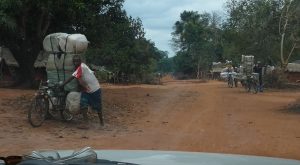 The road is impassable to trucks beyond Abuzi, so bicycle merchants have filled the gap..
The road is impassable to trucks beyond Abuzi, so bicycle merchants have filled the gap..
Before reaching Abuzi, we stopped at the newest region of the Wasolo Pool: Legbala. Because they have no short wave radio nor telephone reception, we caught them by surprise, but they graciously gathered a group of church leaders together to join us in conversation. They, too, had determined to leave the CEUM, calling themselves part of “CEUM-Nord.” Their concerns were similar to those we heard elsewhere: poor management, concentration of power in the hands of a single tribe, and a lack of financial and material assistance from either the CEUM or the Covenant. Unfortunately, I forgot to take photos.
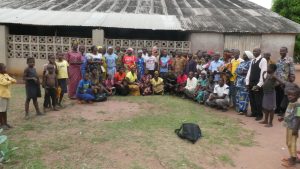
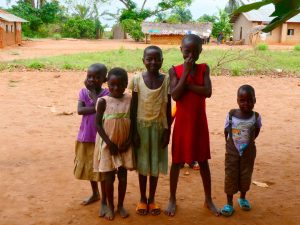 At Abuzi, we met with the people of the central church, the only one in the Abuzi region to leave the CEUM. They expressed much the same concerns as Legbala and others, but the final straw for them was learning that their pastor had not received an assignment within the CEUM.
At Abuzi, we met with the people of the central church, the only one in the Abuzi region to leave the CEUM. They expressed much the same concerns as Legbala and others, but the final straw for them was learning that their pastor had not received an assignment within the CEUM. 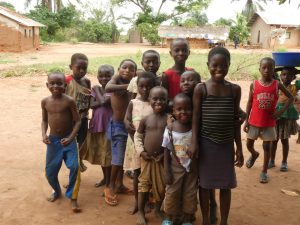 I am unsure of the reasons for the lack of assignment, but the result was clear. His church welcomed him back as their pastor and, because they were going against denominational directive, they withdrew from the CEUM.
I am unsure of the reasons for the lack of assignment, but the result was clear. His church welcomed him back as their pastor and, because they were going against denominational directive, they withdrew from the CEUM.
Reaching Out from Wasolo: Monday and Tuesday
Monday, March 14, we held discussions with several individuals in the early morning. Then, as we headed down the hill for another trip to Yakoma, we met people from CEUM-Réforme who were coming to see me. 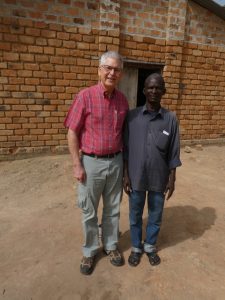 Quickly changing our plans, I spent the next two hours meeting with Freddy Gétonza (the supervisor of 28 breakaway congregations – with me in the photo at right) and others from the immediate Wasolo area.
Quickly changing our plans, I spent the next two hours meeting with Freddy Gétonza (the supervisor of 28 breakaway congregations – with me in the photo at right) and others from the immediate Wasolo area.
It was during that conversation that the request for Covenant intervention within the CEUM finally made sense to me. We Americans avoid interfering in our grown children’s affairs and I kept explaining that to the Congolese, even as they kept insisting that any good parent would intervene if their children were fighting. I finally recognized that a clash of cultures was taking place. By refusing to intervene, we Americans were forcing our cultural values on our Congolese brothers and sisters. From that point on, I was able to respond to those requests for Covenant intervention more sensitively and compassionately.
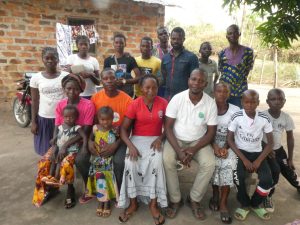 We finally made it to Yakoma where we had a long and fruitful conversation with two assistants to the territorial administrator. On our way back to Wasolo we stopped at Camp Zugbia for a brief visit with the two families and some friends (pictured at left).
We finally made it to Yakoma where we had a long and fruitful conversation with two assistants to the territorial administrator. On our way back to Wasolo we stopped at Camp Zugbia for a brief visit with the two families and some friends (pictured at left). 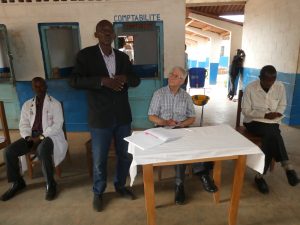 As soon as we reached Wasolo I met with the medical staff and, after dark, with principals and teachers (not pictured) from the local schools. All of these groups and individuals were concerned about the division within the CEUM, but they expressed other concerns as well.
As soon as we reached Wasolo I met with the medical staff and, after dark, with principals and teachers (not pictured) from the local schools. All of these groups and individuals were concerned about the division within the CEUM, but they expressed other concerns as well. 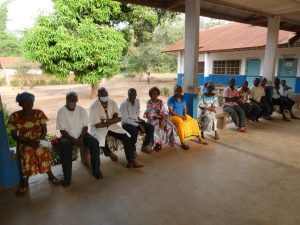 They were struggling to manage an influx of refugees, to build dormitories at the camp, to find new sources of and better transportation for medicines for the hospital, and to imagine a better way to seek assistance for school supplies and facilities.
They were struggling to manage an influx of refugees, to build dormitories at the camp, to find new sources of and better transportation for medicines for the hospital, and to imagine a better way to seek assistance for school supplies and facilities.
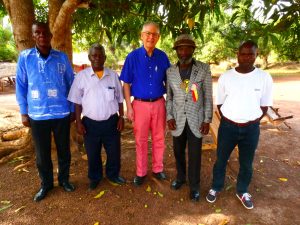 Tuesday morning we headed out on our final trip – this time to Wapinda. Before we had gone five miles, we ran into the second Chef de Groupement from the Wasolo area and were able to have a good conversation with him at a friend’s home.
Tuesday morning we headed out on our final trip – this time to Wapinda. Before we had gone five miles, we ran into the second Chef de Groupement from the Wasolo area and were able to have a good conversation with him at a friend’s home.
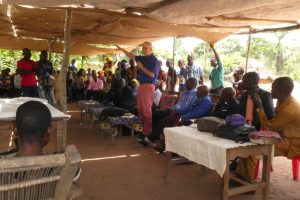 In Wapinda, the CEUM loyalists led by superintendent Koyatene met us on the road and led us to their gathering. We were royally welcomed under the “bâche” (tarp) and I had an opportunity to introduce myself and the work I was doing.
In Wapinda, the CEUM loyalists led by superintendent Koyatene met us on the road and led us to their gathering. We were royally welcomed under the “bâche” (tarp) and I had an opportunity to introduce myself and the work I was doing. 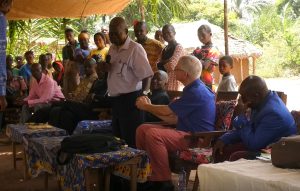 Before giving me the microphone, however, they let former (Honorary) President Luyada, say a few words. This was the first time he had joined me in talking to a group and he choked up when he explained the significance of what we were doing. Having introduced ourselves, we asked to be excused and were graciously permitted to do so. We had promised the breakaway group that we would speak to them first and wanted to keep our promise.
Before giving me the microphone, however, they let former (Honorary) President Luyada, say a few words. This was the first time he had joined me in talking to a group and he choked up when he explained the significance of what we were doing. Having introduced ourselves, we asked to be excused and were graciously permitted to do so. We had promised the breakaway group that we would speak to them first and wanted to keep our promise.
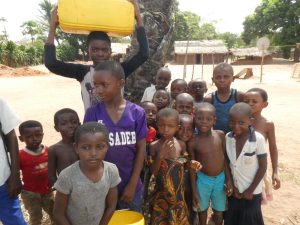 In downtown Wapinda, we met Rev. Kowe and his church. There were so many children and they were so excited about our meeting, that they made it very hard to hear ourselves speak. Eventually, however, they calmed down and we were able to converse.
In downtown Wapinda, we met Rev. Kowe and his church. There were so many children and they were so excited about our meeting, that they made it very hard to hear ourselves speak. Eventually, however, they calmed down and we were able to converse. 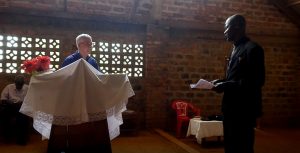 This was another church – indeed a whole region – that left the CEUM because their pastor and superintendent was left without a job. Poor management, concentrated power, the need for the Covenant to intervene, being ignored, and gratefulness for our trip were, once again, the major themes expressed by pastors and laity alike.
This was another church – indeed a whole region – that left the CEUM because their pastor and superintendent was left without a job. Poor management, concentrated power, the need for the Covenant to intervene, being ignored, and gratefulness for our trip were, once again, the major themes expressed by pastors and laity alike.
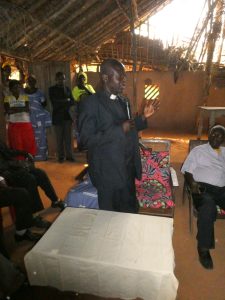
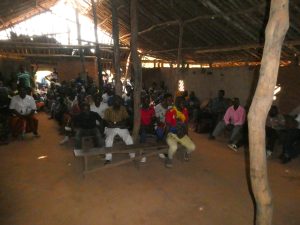 Upon our return to Rev. Koyatene’s parish, we found that the tarp-covered structure (see photos two paragraphs above) had been blown down by the wind. Consequently, we were forced to continue our conversation within the decaying church building next door.
Upon our return to Rev. Koyatene’s parish, we found that the tarp-covered structure (see photos two paragraphs above) had been blown down by the wind. Consequently, we were forced to continue our conversation within the decaying church building next door.
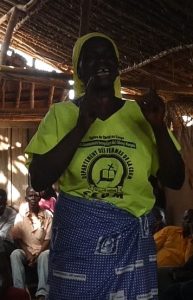
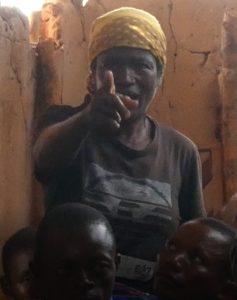 After allowing Rev. Luyada and me to answer questions, Superintendent Ali spoke to everyone in Ngbandi to make sure they understood what had been said. That opened the door and two women stood up and passionately stated their case in Ngbandi. Even though I don’t understand the language, it was fascinating to listen to them speak. Only later did I learn that they were arguing that the CEUM should remove both Rev. Kowe and Rev. Koyatene and install a new superintendent of the Wapinda region who is acceptable to all. Their desire was that all the believers in Wapinda can worship together once again.
After allowing Rev. Luyada and me to answer questions, Superintendent Ali spoke to everyone in Ngbandi to make sure they understood what had been said. That opened the door and two women stood up and passionately stated their case in Ngbandi. Even though I don’t understand the language, it was fascinating to listen to them speak. Only later did I learn that they were arguing that the CEUM should remove both Rev. Kowe and Rev. Koyatene and install a new superintendent of the Wapinda region who is acceptable to all. Their desire was that all the believers in Wapinda can worship together once again.
We had hoped that I could give a brief seminar on project proposal development for the educational, medical, and pastoral staff at Wasolo. Unfortunately, we did not get home until late.
The Final Days
The next morning we rose early, ate one final breakfast at Rev. Ali’s house, and headed for Yakoma. 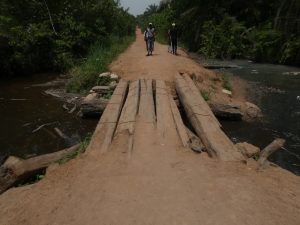 There we stopped at Rev. Zaga’s church for photos and at Rev. Koto Kambo’s church to deliver a laptop that I had set up the night before.
There we stopped at Rev. Zaga’s church for photos and at Rev. Koto Kambo’s church to deliver a laptop that I had set up the night before. 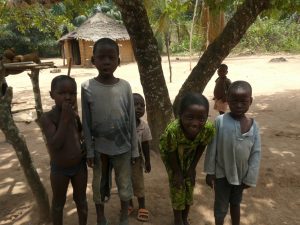 As an aside, I am providing some logistical support for the Continuing Education team of which Rev. Koto Kambo is a part. From Yakoma, we headed back to Kotakoli. Only one bridge gave us much trouble, with the log collapsing under our right rear tire. If you look closely, you can see assistant driver, Seconde, on the opposite side giving directions.
As an aside, I am providing some logistical support for the Continuing Education team of which Rev. Koto Kambo is a part. From Yakoma, we headed back to Kotakoli. Only one bridge gave us much trouble, with the log collapsing under our right rear tire. If you look closely, you can see assistant driver, Seconde, on the opposite side giving directions.
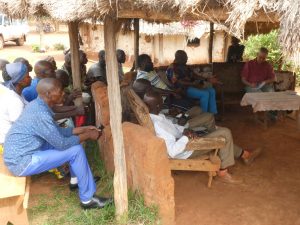
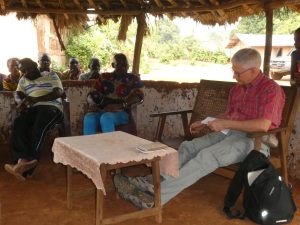 At Kotakoli, we joined in conversation with people loyal to the CEUM, but that did not stop them from criticizing the “gestion” (management) of CEUM work. They had worked hard to build a health center, but when the time came to staff and supply it, there was no CEUM money to do so. More interesting to me was a suggestion that the CEUM constitution and governing statutes, themselves, needed to be modified to allow for a better distribution of power and management. This suggestion came from an outspoken layman who was encouraged by the fact that I, too, am a layman and one who has studied administration and management extensively.
At Kotakoli, we joined in conversation with people loyal to the CEUM, but that did not stop them from criticizing the “gestion” (management) of CEUM work. They had worked hard to build a health center, but when the time came to staff and supply it, there was no CEUM money to do so. More interesting to me was a suggestion that the CEUM constitution and governing statutes, themselves, needed to be modified to allow for a better distribution of power and management. This suggestion came from an outspoken layman who was encouraged by the fact that I, too, am a layman and one who has studied administration and management extensively.
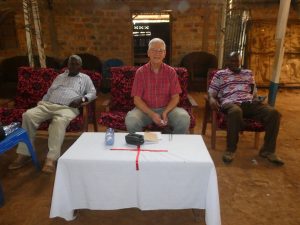
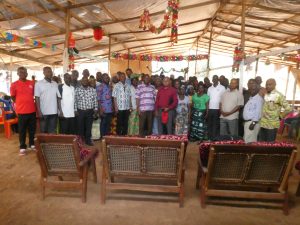 Once again, we arrived at Gbadolite after dark. However, we were able to arrange two meetings for the morning. At 8:00 we would meet under the “bâche” (tarp) with CEUM loyalists; at 10:30 I would meet at the Macedoine church compound with people from the “Trois Pools” movement. The first meeting included criticism of the CEUM and an appeal for help from the American Covenant, but it was criticism and an appeal from within the CEUM. Those worshiping under the “bâche” feel persecuted by those who have taken over their buildings. They long for a time when all will worship together again. As at Wasolo, the youth are less patient but most are willing to wait for the right time.
Once again, we arrived at Gbadolite after dark. However, we were able to arrange two meetings for the morning. At 8:00 we would meet under the “bâche” (tarp) with CEUM loyalists; at 10:30 I would meet at the Macedoine church compound with people from the “Trois Pools” movement. The first meeting included criticism of the CEUM and an appeal for help from the American Covenant, but it was criticism and an appeal from within the CEUM. Those worshiping under the “bâche” feel persecuted by those who have taken over their buildings. They long for a time when all will worship together again. As at Wasolo, the youth are less patient but most are willing to wait for the right time.
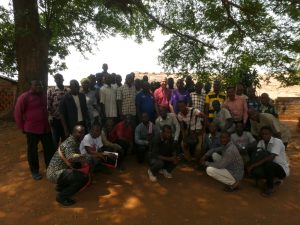 The meeting with the “Trois Pools” people was less congenial. The actions attributed to certain CEUM leaders were far from complementary, the words spoken were often hard, and for the first time on my trip, the American Covenant was criticized. I responded as clearly, gently, and honestly as I could and asked for forgiveness for sins committed.
The meeting with the “Trois Pools” people was less congenial. The actions attributed to certain CEUM leaders were far from complementary, the words spoken were often hard, and for the first time on my trip, the American Covenant was criticized. I responded as clearly, gently, and honestly as I could and asked for forgiveness for sins committed. 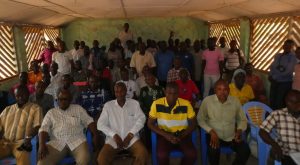 At the end of our meeting, we took pictures together; the series of photos below shows a lightening of the mood as scowls in the front row turned to laughter.
At the end of our meeting, we took pictures together; the series of photos below shows a lightening of the mood as scowls in the front row turned to laughter. 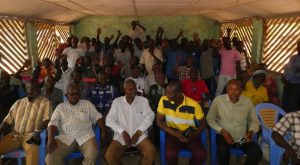 However, I left this meeting weighed down rather than hopeful as I had after the others.
However, I left this meeting weighed down rather than hopeful as I had after the others.
On an encouraging note, I noticed the Trois Pools leadership trying to ease tensions 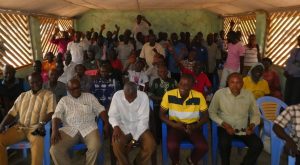 during our meeting and I was later told that some of those present apologized for words spoken to me that they thought were too harsh. What I know for certain is that God is at work and will bring about his Kingdom with or without us. My desire is to do what I can to contribute to that work.
during our meeting and I was later told that some of those present apologized for words spoken to me that they thought were too harsh. What I know for certain is that God is at work and will bring about his Kingdom with or without us. My desire is to do what I can to contribute to that work.
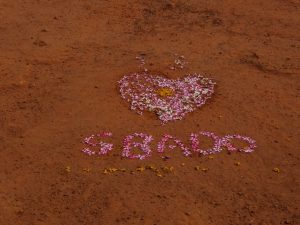
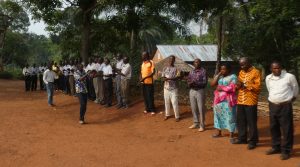 We returned to Gbado Gboketsa to drop off Honorary President Luyada about mid afternoon. There we were again welcomed by his wife, Elise, the Bible Institute students, and other leaders of that community. This was my third stop at Gbado Gboketsa in less than a year – something of a miracle. Another small miracle was that we even got a smile out of Rev. Luyada for one of our pictures! We enjoyed a meal; I left my Bible for the Bible Institute library, and we headed for Karawa, arriving about 8:30 that night.
We returned to Gbado Gboketsa to drop off Honorary President Luyada about mid afternoon. There we were again welcomed by his wife, Elise, the Bible Institute students, and other leaders of that community. This was my third stop at Gbado Gboketsa in less than a year – something of a miracle. Another small miracle was that we even got a smile out of Rev. Luyada for one of our pictures! We enjoyed a meal; I left my Bible for the Bible Institute library, and we headed for Karawa, arriving about 8:30 that night.